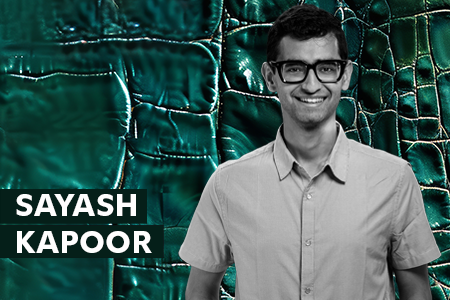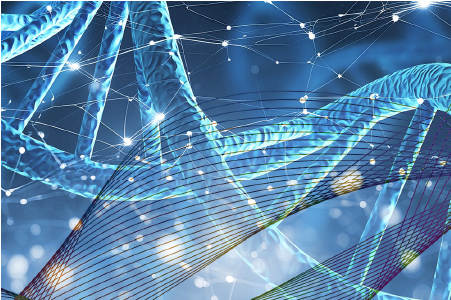- 10/25/2024
In his most recent book, Superconvergence: How Genetics, Biotech, and AI Revolutions Will Transform Our Lives, Work, and World, Jamie Metzl, OpenShared.World founder and author of Hacking Darwin, explains how these emerging technologies will improve our health, boost our economies, and restore the environment.
John Dalton, VP of Research at FCAT, spoke with Metzl about his research into these weighty topics, his greatest concerns, and how he hopes we can move forward as a society.
Your book covers a wide range of technologies and potentially life-changing applications. What excites you most?
This really is such an exciting moment in human history. The big story isn't any one technology — although many of us are excited about AI, genetics, and biotechnology. The big story is the coming together of all of these technologies and the accelerating rates of change that every technology begets of every other technology. The computer codes that process everything that's happening in our virtual interactions, if we look at those codes, what do we see? We see Latin letters, Arabic numbers. Those ancient writing and notation systems, which were of course profound innovations in their own right, have made so many revolutions possible and are fueling the AI revolution right now. And using the tools of AI, we're able to interrogate living systems like how a plant diffuses nutrients through its leaves and then, looking at those models that have evolved over nearly 4 billion years, we're able to design better, smarter, faster computer chips that speed up our machine learning, our AI, our ability to interact and manipulate natural and other systems around us. So, it's really just an incredible story of deep civilizational change enabled by the convergence of many technologies and our growing knowledge.
Can you give a tangible example of how you see this playing out?
Sure. Think about what DeepMind has already accomplished with protein folding. Protein folding is a massively complex phenomenon, but if we can figure out how it works, it could lead to truly breakthrough therapies. The old-fashioned way of going about this was crystallizing the protein on a tiny micro level and then bombarding it with X-rays and filming those X-rays to try to get a sense of the shape. That’s called X-ray crystallography. It takes somewhere between one and ten years to do a single protein. There are 215 million proteins known to science. Not encouraging. But DeepMind’s AlphaFold has completely reset the time horizon. In 2020, AlphaFold won the international competition predicting protein shapes, and the next year, DeepMind, along with the European Bioinformatics Institute, released the predicted shapes of 350,000 proteins. If you do the math, multiplying that number by three — which was the average time for predicting protein shape — that’s saving about one million years of human work. In 2022, they released the predicted shapes of 215 million proteins; that’s saving over 600 million years. That’s a lot of saved time that we can now devote to solving other categories of problems.
And that same technology is moving up the scale of solving more advanced math problems too. So, it’s not just an advance in biological research but a whole suite of improvements across multiple domains, freeing up researchers to ask and pursue new challenges. That’s why I titled the book Superconvergence — it’s about the intersection of many disciplines and technologies and the cumulative effect this is having on our world.
Yes, and in your book, you emphasize that this kind of convergence can’t happen soon enough. We desperately need new approaches to a whole suite of challenges, especially agriculture.
We've tripled agricultural productivity over the last 50 to 60 years because of modern agriculture. But it’s come at a cost. Basically, about three quarters of all of our agriculture, land, and resources goes into supporting industrial animal agriculture, which has all of these negative externalities — not just the cruelty of slaughtering 72 billion land animals per year but increased environmental, climate, and pandemic risk. Plus, we’re going towards ten billion people within two or three decades, and they're going to be wealthier people. And they're going to want to live like us. They're going to want to eat like us, and they should.
But if we just scale up what we're doing now, we're going to have to destroy all of our wild spaces. So, there are new models for boosting agricultural productivity. Part is through genetic means. It's not genetic modification, but it's genetic manipulation of the genes. It's a field in its infancy. But if we can get the animal products that we want using the tools of modern synthetic biology, and we can do it at scale without all of these negative externalities, that’s a better thing than decimating our planet.
I’m glad you mention that, because the changes you’re describing aren’t abstract at all. They’re quite personal and involve making adjustments to some of the most basic parts of our lives, like what we eat, how we learn, and what we do for a living. You’re describing a world of dramatic, rapid change. How do you recommend we prepare for that?
A lot of people ask me, what does this mean for me? I get that this AI story is big and broad, and it can be scary for people. So, I've really broken it down to what I see are the three core principles for how all of us can try to navigate this era of rapid change.
The first is that there are lots of people who say the future belongs to AI, and the humans are just the Neanderthals. That’s just not true. We humans have a lot of tricks up our sleeves, but what we need to do is be the best possible humans. We can't be second rate. So, first think about your job and break that job down into ten essential tasks, and for each of those tasks, ask yourself, “Ten years from now, do I think this task will be best carried out by a machine, by a human, or some combination?” If the answer is a machine, you should be spending a lot of time figuring out what's the best way to let a machine do that task. If the answer is a human, you should be spending a lot of your energy focusing on how you can become the best possible human doing that. And, if the answer is somewhere in the middle, then I’d start thinking hard about how humans and machines can best work together to get that job done.
Second, is learning. We need to be spending, I think, at least two hours a day learning things that are adjacent to our direct line of sight. The competitors in our world today aren't the people you see right in front of you. Remember what happened to Kodak. There are all kinds of changes that are happening outside of your direct line of sight, so just follow your curiosity. But this really has to be about learning and not just on an individual level. Every organization needs to be a learning organization — that doesn't mean that every organization needs to turn itself inside out, but if you aren't learning, you're aren't going to be able to frame the right questions.
And the third point is about values: these technologies are certainly new, but the values that we need to guide our decision-making are, in many ways, not new. And, if we make this a conversation about technology itself, we're going to not only get lost but make some really bad decisions. What is your North Star? As a company, as an individual, as a unit? What are you really trying to achieve? And then, how can technology help us achieve those goals? If we say, if the question is, “AI is really important, how do we use AI?” — it's not only the wrong question, but it's like starting out on it from the wrong trailhead, and it guarantees that you won’t get where you want to go.











